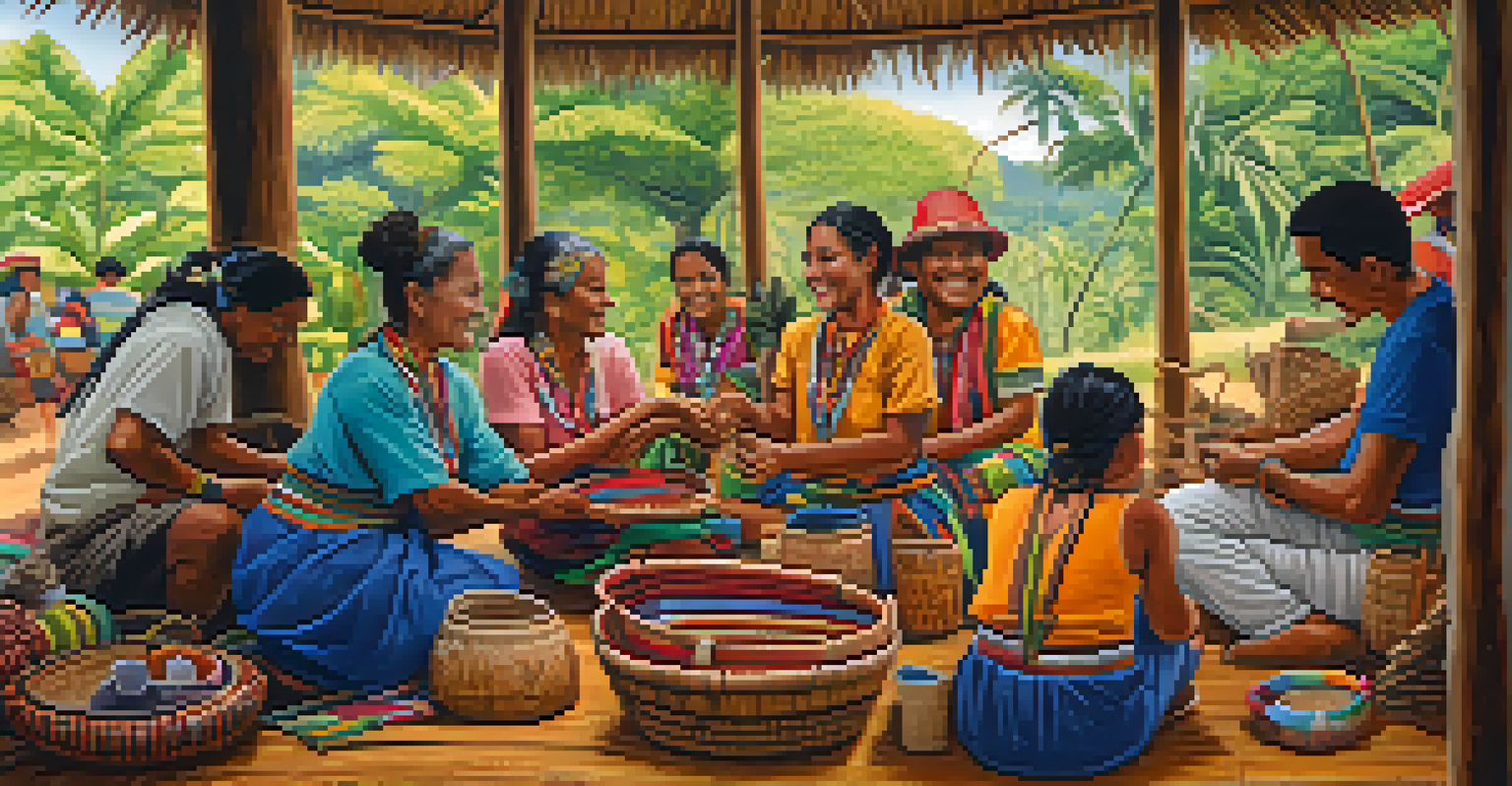Eco-Tourism in Brazil: Culture Meets Nature

Understanding Eco-Tourism: A Brief Overview
Eco-tourism is a responsible travel approach that emphasizes conservation and cultural understanding. It encourages tourists to engage with natural environments while promoting sustainability. In Brazil, this means exploring diverse ecosystems, from the Amazon rainforest to the Pantanal wetlands, while respecting local communities.
The Earth does not belong to us: we belong to the Earth.
The essence of eco-tourism lies in minimizing the environmental impact of travel. This involves choosing eco-friendly accommodations, participating in guided tours that support conservation efforts, and being mindful of one's carbon footprint. Brazil, with its rich biodiversity, is a prime destination for eco-tourists seeking authentic experiences.
By choosing eco-tourism, travelers can contribute to the preservation of Brazil's natural beauty and cultural heritage. It's not just about seeing the sights; it's about making a positive impact on the places we visit and the people we meet.
Brazil’s Diverse Ecosystems: A Nature Lover's Paradise
Brazil is home to some of the most biodiverse ecosystems on the planet. The Amazon rainforest, often dubbed the 'lungs of the Earth,' is a vast expanse of lush greenery teeming with life. Visitors can embark on guided tours to witness unique wildlife, including jaguars, sloths, and countless bird species.

In addition to the rainforest, Brazil features the Pantanal, the world's largest tropical wetland. This area is a haven for bird watchers and wildlife enthusiasts, offering opportunities to see caimans, capybaras, and the elusive jaguar in their natural habitat. Eco-tourism here often includes boat tours and wildlife safaris led by local experts.
Eco-Tourism Promotes Sustainability
Eco-tourism focuses on responsible travel that minimizes environmental impact while supporting conservation and local communities.
The Atlantic Forest and the Cerrado regions also showcase Brazil's diverse landscapes, each with its own unique flora and fauna. Eco-tourists can explore these areas through hiking, bird-watching, and community-led initiatives that promote conservation and education.
Cultural Experiences: Engaging with Local Communities
One of the most enriching aspects of eco-tourism in Brazil is the opportunity to connect with local cultures. Many eco-tourism projects focus on empowering indigenous communities, allowing travelers to learn about their traditions, crafts, and ways of life. This cultural exchange fosters mutual respect and understanding.
Traveling – it leaves you speechless, then turns you into a storyteller.
Participating in workshops, such as traditional cooking classes or handicraft sessions, provides visitors with a deeper appreciation for Brazil's cultural heritage. This hands-on experience not only supports local economies but also helps preserve age-old traditions that might otherwise fade away.
Moreover, festivals and local celebrations offer vibrant glimpses into Brazilian culture. Eco-tourists can immerse themselves in these events, which often emphasize sustainability and community, creating a more memorable travel experience.
Sustainable Practices: Protecting Brazil's Environment
Sustainability is at the heart of eco-tourism, and Brazil is leading the way with innovative practices. Many eco-lodges and tour operators prioritize renewable energy, waste reduction, and conservation initiatives to minimize their ecological footprint. This commitment to sustainability is essential for preserving Brazil's natural wonders.
Travelers can make a difference by choosing eco-friendly accommodations that adhere to sustainable practices. These establishments often source food locally, use solar energy, and implement waste management programs. Supporting such businesses ensures that tourism benefits both the environment and the local community.
Brazil's Rich Biodiversity Awaits
Home to diverse ecosystems like the Amazon and Pantanal, Brazil offers unique wildlife experiences for eco-tourists.
Additionally, participating in conservation efforts, such as tree planting or wildlife monitoring, allows visitors to contribute actively to preserving Brazil's biodiversity. These hands-on experiences create a sense of purpose and connection to the places we explore.
Wildlife Conservation: Protecting Brazil's Unique Species
Brazil is home to an astonishing array of wildlife, many of which are endangered. Eco-tourism plays a crucial role in wildlife conservation by funding protective measures and raising awareness about the importance of preserving these species. Tourists can contribute to these efforts simply by choosing eco-friendly tours.
Organizations that focus on wildlife conservation often offer eco-tourists the chance to participate in research projects or volunteering opportunities. Engaging in these activities not only helps protect vulnerable species but also provides a unique perspective on conservation efforts in the field.
By promoting responsible wildlife viewing and education, eco-tourism helps mitigate human-wildlife conflicts. This collaborative approach fosters coexistence and ensures that future generations can experience Brazil's incredible biodiversity.
Adventure Activities: Thrilling Ways to Explore Nature
For those seeking adventure, eco-tourism in Brazil offers an array of thrilling activities that allow travelers to explore nature up close. From hiking through dense rainforests to kayaking along pristine rivers, there's no shortage of excitement for the adventurous spirit. These activities often have a minimal environmental impact when conducted responsibly.
Birdwatching is another popular eco-tourism activity, with Brazil boasting some of the richest birdlife in the world. Eco-tourists can join guided tours to spot rare and colorful species in their natural habitats. This not only brings joy to bird enthusiasts but also raises awareness about the need for conservation.
Cultural Connections Enhance Travel
Engaging with local communities through cultural experiences empowers indigenous people and fosters mutual respect.
Moreover, eco-tourism operators often emphasize safety and respect for nature, ensuring that adventure activities do not harm the environment. This balance between thrill-seeking and sustainability makes for a rewarding travel experience.
Planning Your Eco-Tourism Adventure in Brazil
Planning an eco-tourism adventure in Brazil requires a bit of research to ensure a responsible and enjoyable experience. Start by identifying regions you want to explore, such as the Amazon, Pantanal, or coastal areas, each offering unique opportunities for eco-tourism. Consider what activities resonate most with you—be it wildlife viewing, cultural exchanges, or adventure sports.
Next, choose accommodations and tour operators that prioritize sustainability and community involvement. Reading reviews and checking certifications can help you find eco-friendly options. Engaging with local guides not only enriches your experience but also supports the local economy.

Lastly, be prepared to embrace the unexpected. Eco-tourism often leads to spontaneous encounters with wildlife or cultural events, adding an element of surprise to your journey. With an open mind and heart, your eco-adventure in Brazil promises to be both memorable and meaningful.